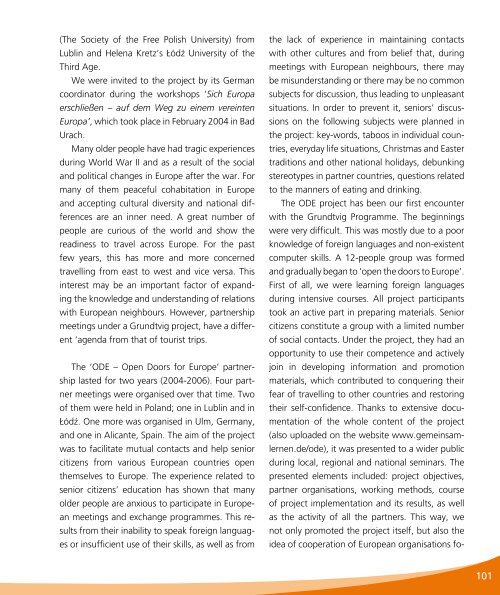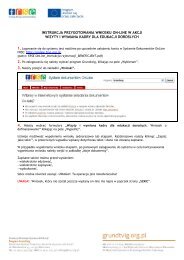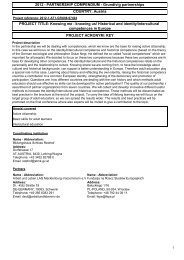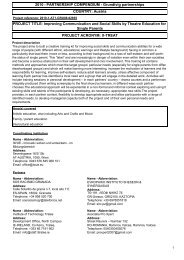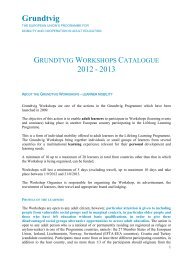Pobierz plik - Grundtvig
Pobierz plik - Grundtvig
Pobierz plik - Grundtvig
Create successful ePaper yourself
Turn your PDF publications into a flip-book with our unique Google optimized e-Paper software.
(The Society of the Free Polish University) from<br />
Lublin and Helena Kretz’s Łódź University of the<br />
Third Age.<br />
We were invited to the project by its German<br />
coordinator during the workshops ‘Sich Europa<br />
erschließen – auf dem Weg zu einem vereinten<br />
Europa‘, which took place in February 2004 in Bad<br />
Urach.<br />
Many older people have had tragic experiences<br />
during World War II and as a result of the social<br />
and political changes in Europe after the war. For<br />
many of them peaceful cohabitation in Europe<br />
and accepting cultural diversity and national differences<br />
are an inner need. A great number of<br />
people are curious of the world and show the<br />
readiness to travel across Europe. For the past<br />
few years, this has more and more concerned<br />
travelling from east to west and vice versa. This<br />
interest may be an important factor of expanding<br />
the knowledge and understanding of relations<br />
with European neighbours. However, partnership<br />
meetings under a <strong>Grundtvig</strong> project, have a different<br />
‘agenda from that of tourist trips.<br />
The ‘ODE – Open Doors for Europe’ partnership<br />
lasted for two years (2004-2006). Four partner<br />
meetings were organised over that time. Two<br />
of them were held in Poland; one in Lublin and in<br />
Łódź. One more was organised in Ulm, Germany,<br />
and one in Alicante, Spain. The aim of the project<br />
was to facilitate mutual contacts and help senior<br />
citizens from various European countries open<br />
themselves to Europe. The experience related to<br />
senior citizens’ education has shown that many<br />
older people are anxious to participate in European<br />
meetings and exchange programmes. This results<br />
from their inability to speak foreign languages<br />
or insufficient use of their skills, as well as from<br />
the lack of experience in maintaining contacts<br />
with other cultures and from belief that, during<br />
meetings with European neighbours, there may<br />
be misunderstanding or there may be no common<br />
subjects for discussion, thus leading to unpleasant<br />
situations. In order to prevent it, seniors’ discussions<br />
on the following subjects were planned in<br />
the project: key-words, taboos in individual countries,<br />
everyday life situations, Christmas and Easter<br />
traditions and other national holidays, debunking<br />
stereotypes in partner countries, questions related<br />
to the manners of eating and drinking.<br />
The ODE project has been our first encounter<br />
with the <strong>Grundtvig</strong> Programme. The beginnings<br />
were very difficult. This was mostly due to a poor<br />
knowledge of foreign languages and non-existent<br />
computer skills. A 12-people group was formed<br />
and gradually began to ‘open the doors to Europe’.<br />
First of all, we were learning foreign languages<br />
during intensive courses. All project participants<br />
took an active part in preparing materials. Senior<br />
citizens constitute a group with a limited number<br />
of social contacts. Under the project, they had an<br />
opportunity to use their competence and actively<br />
join in developing information and promotion<br />
materials, which contributed to conquering their<br />
fear of travelling to other countries and restoring<br />
their self-confidence. Thanks to extensive documentation<br />
of the whole content of the project<br />
(also uploaded on the website www.gemeinsamlernen.de/ode),<br />
it was presented to a wider public<br />
during local, regional and national seminars. The<br />
presented elements included: project objectives,<br />
partner organisations, working methods, course<br />
of project implementation and its results, as well<br />
as the activity of all the partners. This way, we<br />
not only promoted the project itself, but also the<br />
idea of cooperation of European organisations fo-<br />
101


